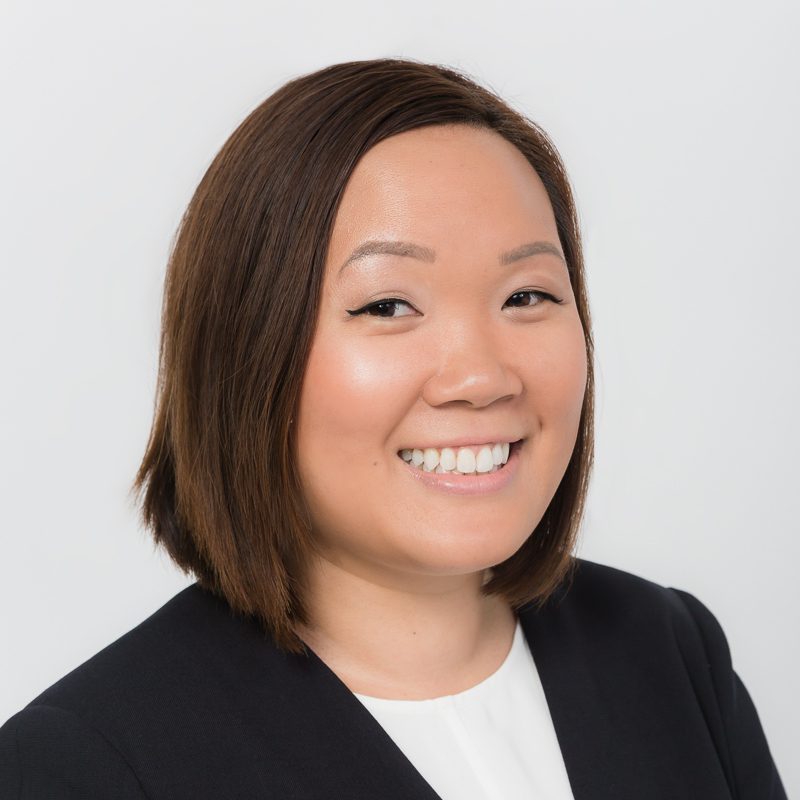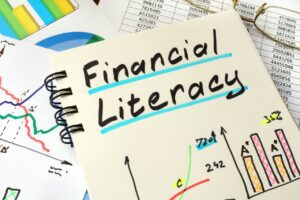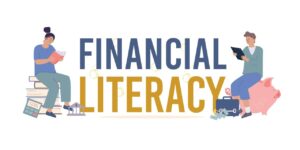If you want to improve your financial literacy, then there’s no better time than now. In fact, November is Financial Literacy Month (FLM) in Canada. This month-long event aims to help Canadians improve their money management, reduce debt, and plan for retirement.
This year’s theme for Financial Literacy Month is “talk money”. Talking about money daily may help us feel more comfortable discussing money with friends and family.
In honour of FLM, I’ve compiled a list of my favourite Fin Lit resources to help you become more financially literate.
Why financial literacy matters
Being financially literate allows you to earn, save, spend, and use credit wisely. The more we improve our financial well-being as Canadians, the better our decision-making will be.
It’s common for middle-aged Canadians to carry some form of debt, such as credit card debt or student loans. Interest rates and inflation make it challenging to balance financial obligations. 54% of Canadian households said that they struggled to keep up with their financial commitments, according to a survey by the Financial Consumer Agency of Canada (FCAC). FLM’s goal is to help Canadians build strong personal finance skills that can help them regain financial stability.
Books that simplify money
Here are notable books that teach about personal finance.
- “Everything But Money” by Jessica Moorhouse
- “Happy Go Money” by Melissa Leong
- “Making Bank: Money Skills for Real Life” by Shannon Lee Simmons
- “Money Like You Mean It” by Erica Alini
- “Save Yourself” by Kelley Keehn
- “Stop Overthinking Your Money” by Preet Banerjee
Podcasts that make you financially savvy
When you’re on the go, add these popular podcasts to your playlist:
- “Stress Test” The Globe and Mail – hosted by Roma Luciw & Rob Carrick
- “The Rational Reminder” – hosted by Benjamin Felix, Cameron Passmore, and Dan Bortolotti, Portfolio Managers at PWL Capital.
- “The Wealthy Barber Podcast” – hosted by David Chilton
- “Views From The Desk” & “The Open Outcry” Podcasts – hosted by BMO ETFs
Online personal finance courses
To level up your money management skills, there are several free in-depth courses that you can take. These self-paced programs focus on the basics of personal finance, investing, and taxes.
- Desjardins: Personal Finance: I’m In Charge
- Get Smarter About Money: Investing and money management courses
- Government of Canada: Learn About Your Taxes
- McGill University: Personal Finance Essentials
Financial literacy Events
- BuildHer Conference: A one-day event that empowers women to take control of their financial future.
- Canadian Financial Summit: Learn from 40+ personal finance experts to help you save more, invest better, and worry less.
- Raising Generational Wealth: This virtual summit helps parents secure a brighter future for their family.
- Wealthy(HER) Conference: A full-day conference that transforms how women view money and wealth.
Trusted Canadian websites
The following are reputable websites where you can find resources about financial literacy:
- Canadian Foundation for Economic Education (CFEE): Offers programs focused on financial literacy and capability.
- Financial Consumer Agency of Canada (FCAC): To help you understand your consumer rights about financial services and products.
- Financial Post: For the latest news and industry headlines.
- TD Direct Investing: Watch webinars featuring guest speakers who discuss investing and trading strategies.
- Wealthsimple: Offers a Personal Finance 101 section to help you learn how to manage your money.
Handy tools and calculators
When you’re crunching numbers, use these tools to help you determine what actions to take to reach your goals:
- Budget planner – Financial Consumer Agency of Canada: Use this tool to help manage your household expenses.
- Canadian retirement income calculator – Government of Canada: Estimate how much money you’ll have in retirement.
- Compound interest calculator – Ontario Securities Commission: Find out how much your investments will grow over time.
- Credit Card Debt Repayment Calculator – Consolidated Credit Canada: Determine how long it will take for you to pay off your credit card.
- FI/RE calculator – Hardbacon: Find out how soon you can become financially independent and retire early.
- Income tax calculator – Wealthsimple: Find out the amount of your tax refund or what you’ll owe in taxes.
- Mortgage calculator – CMHC: Discover how much your mortgage payments will be.
Instagram personal finance experts
Check out these content creators who are sharing personal finance strategies:
- azia_mery: Azia teaches how to invest in wealth & health
- barry_choi: Barry is a loyalty points, credit cards & travel expert
- canadianbudget: Jess helps Canadian women budget, invest and build financial literacy
- stephandden: Steph & Den make money simple
- teach.kids.money: Maya educates parents on how to teach their kids about money.
- xoreni: Reni is a finance and travel creator
How you can put financial literacy into action
Here are six steps you can take this FLM to improve your financial situation:
- Review your finances. Track your income and expenses by reviewing your bank accounts. Next, create a household budget to understand how your money is allocated.
- Set up an emergency fund. Have a separate savings account to save money for unexpected expenses. Emergencies include a house or car repair, a medical bill, or a job loss.
- Find out your credit score and credit report. You can get this information through Equifax Canada or TransUnion Canada. The higher your credit score, the easier it is to borrow money.
- Set financial goals. Set realistic short-term and long-term goals.
- Negotiate with your credit card provider. If you’re carrying credit card debt, you can ask your credit card company to lower your interest rate.
- Get professional guidance. You can talk to a Credit Counsellor to manage your debt. Or consult a financial adviser to review your retirement savings and debt, and receive guidance on financial planning.
Boost your financial literacy skills
You can start by choosing one resource. Whether it’s a book, podcast, or tool, begin your financial literacy journey this November. Educating yourself on money matters can help you reduce your debt and improve your financial management skills.
Take advantage of Financial Literacy Month to learn one new skill to help you save, spend, and invest in your future. If your goal is to reduce your debt for FLM, our Credit Counsellors can help you come up with a customized debt repayment plan.





